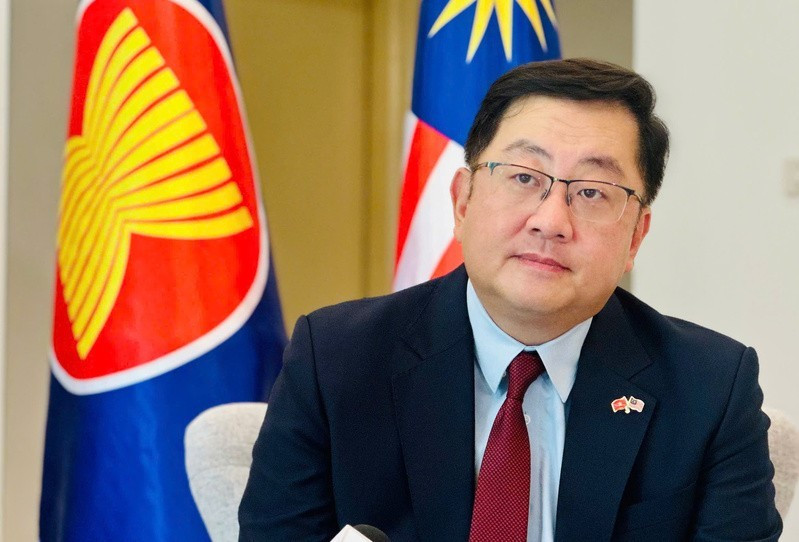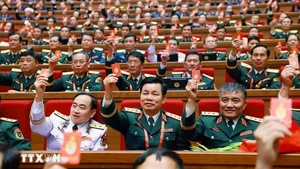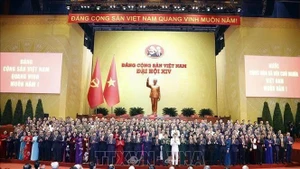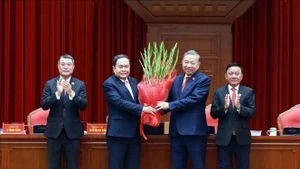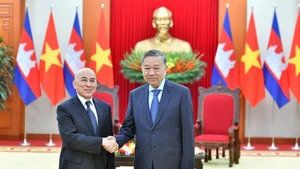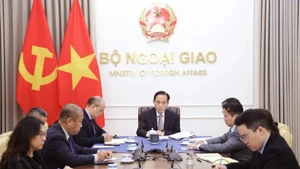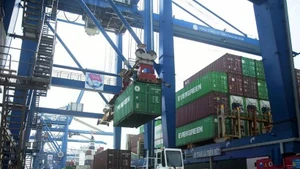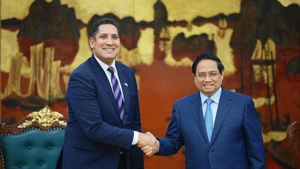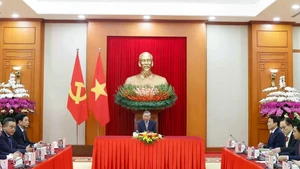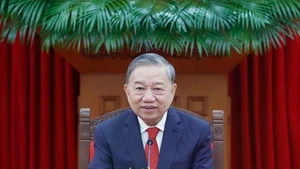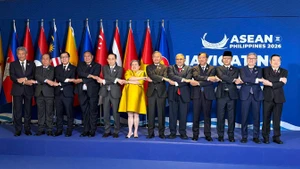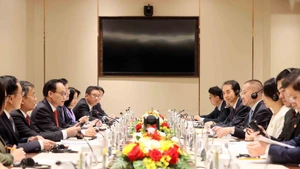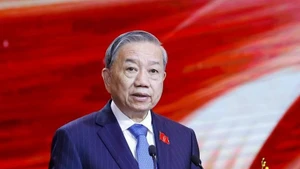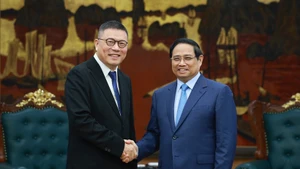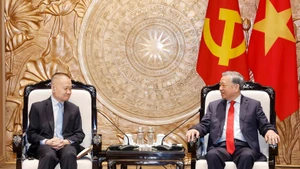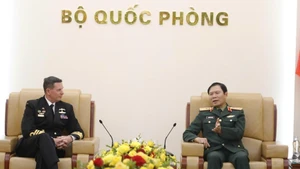Malaysian Ambassador to Viet Nam Dato’ Tan Yang Thai shared his views with a reporter from Nhan Dan Newspaper.
Reporter: Could you share Malaysia’s preparations as the ASEAN Chair in 2025 towards the 10th anniversary of the ASEAN Community? Could you also speak about the significance of the “Inclusive and Sustainable” theme for Malaysia’s ASEAN Chairmanship in 2025?
Dato’ Tan Yang Thai, Ambassador of Malaysia to Viet Nam: The Kuala Lumpur Declaration has turned ASEAN’s 10-year review into a 20-year strategic outlook. This declaration contributes to strengthening ASEAN institutions, ensuring annual accountability, and placing people at the centre of a resilient and innovative community. It demonstrates that ASEAN is not just planning for the next summit, but for the next generation.
Let us look back on the 10-year journey of building the ASEAN Community (2015–2025), which has been a critical period. As we know, the Kuala Lumpur/Langkawi Declaration of December 2015 transformed ASEAN into a rules-based community built on three coordinated pillars.
The celebration of the 10th anniversary of the ASEAN Community will be an opportunity for leaders to reflect on the challenges faced during community building — such as the digital divide, supply chain resilience, and mobilisation of green finance — while summarising key lessons and integrating them into the post-2025 agenda.
The recently adopted Kuala Lumpur Declaration on ASEAN 2045 has outlined our shared future. It marks the first time ASEAN leaders have adopted a single political declaration with a framework stretching to 2045 — doubling the conventional 10-year planning cycle — thereby helping investors, donors, and citizens understand the direction in which the ASEAN Community is heading.
The declaration also adopts the ASEAN Community Vision 2045 and four specific strategic plans for the four pillars — political-security, economics, socio-cultural community, and connectivity — thereby ensuring comprehensive development across all sectors. ASEAN leaders have tasked the bloc with “enhancing institutional capacity and effectiveness” and strengthening the ASEAN Secretariat, while reflecting a collective commitment to increase resources and accelerate decision-making amid deepening regional cooperation.
The declaration emphasises a “resilient, innovative, dynamic and people-centred ASEAN”, reaffirming the association’s core spirit of delivering tangible benefits to the people. This aligns fully with Malaysia’s chosen theme for the 2025 ASEAN Chairmanship: “Inclusive and Sustainable”.
During its ASEAN chairmanship in 2025, Malaysia has chosen the theme “Inclusive and Sustainable”. “Inclusive” means ensuring all ASEAN citizens experience the benefits of the community in their daily lives. Malaysia’s goal is to “leave no one behind” by narrowing development gaps within the bloc, enabling equitable economic opportunities, and strengthening social protection across ASEAN. “Sustainable” refers to safeguarding the interests of future generations. ASEAN will therefore enhance efforts on climate resilience, clean energy transition, sustainable investment, and environmental governance, integrating green finance and energy frameworks across member states.
To realise these goals, Malaysia is spearheading several ASEAN-wide initiatives. These include the Digital Plan and Green Plan, under which Malaysia will promote the finalisation of the ASEAN Digital Economy Framework Agreement (DEFA) and the ASEAN Green Deal 2030, paving the way for an inclusive digital market and mobilisation of climate finance. Additionally, as ASEAN Chair, Malaysia will support the expansion of the ASEAN Power Grid, linking energy security with fair and sustainable development throughout the region.
Reporter: The year 2025 marks an important milestone for Viet Nam as the country celebrates 30 years of ASEAN membership, opening new opportunities for its growth and deeper integration within the region and the world. How would you assess Viet Nam’s role, position and contributions to the realisation of ASEAN’s development visions?
Dato’ Tan Yang Thai, Ambassador of Malaysia to Viet Nam: Viet Nam’s contributions to ASEAN are first evident in its efforts to promote integration and institution-building within ASEAN during the 1995–2005 period.
Joining ASEAN on July 28, 1995, Viet Nam became the seventh member and a driving force in ASEAN’s expansion, making it a “common home” for all 10 Southeast Asian nations by 1999.
In 1998, as ASEAN Chair, Viet Nam hosted the 6th ASEAN Summit and formulated the bloc’s first Work Programme towards the ASEAN Vision 2000. Viet Nam also played an active role in establishing key ASEAN mechanisms such as ASEAN+3, the East Asia Summit, and the ASEAN Regional Forum, thereby helping the bloc expand its dialogue partnerships and global stature.
During 2005–2015, Viet Nam made notable contributions to building the ASEAN Community. It was actively involved in developing and implementing the ASEAN Charter (2008) and supported the establishment of the ASEAN Community in 2015.
By advocating compliance with legal instruments and norms, Viet Nam has helped shape ASEAN’s rules-based regional order. As ASEAN Chair in 2010, Viet Nam took the lead in advancing ASEAN’s agenda and contributed to the establishment and development of the ASEAN Defence Ministers’ Meeting Plus (ADMM+), which has since become a key regional security mechanism.
In the 2015–2025 period, Viet Nam’s leadership within ASEAN has been particularly shown in guiding and cooperating with member states to overcome major challenges. Notably, Viet Nam served as ASEAN Chair in 2020, at the height of the COVID-19 pandemic.
Viet Nam hosted ASEAN’s first online Summit, established the ASEAN COVID-19 Response Fund, encouraged coordinated recovery measures among member states, and maintained ASEAN’s unity amid increasing competition among major powers and tensions in the East Sea/South China Sea.
Viet Nam has emerged as one of ASEAN’s most dynamic economies, helping to raise the bloc’s global trade position. It has played a key role in ratifying and implementing the Regional Comprehensive Economic Partnership (RCEP) and boosting intra-ASEAN and ASEAN+6 trade. Viet Nam has actively supported ASEAN’s economic integration goals, including narrowing development gaps through initiatives such as the Initiative for ASEAN Integration (IAI) and Mekong sub-regional frameworks.
Viet Nam continues to safeguard ASEAN’s centrality in regional diplomacy and cooperation. Regarding the East Sea/South China Sea issue, Viet Nam has helped shape ASEAN’s shared stance on peaceful dispute resolution based on international law, especially the 1982 United Nations Convention on the Law of the Sea (UNCLOS), and has promoted the agenda to formulate a Code of Conduct (COC) in the East Sea/South China Sea.
In addition, Viet Nam has actively promoted ASEAN cooperation in culture, education, and youth affairs. It has hosted the ASEAN School Games and promoted the Vietnamese language and culture through ASEAN forums. It also supports ASEAN’s people-centred agenda, promote disaster relief, health security and labour initiatives and promote gender equality, rural development, and human resource development.
Over the past 30 years, Viet Nam has become a trustworthy and constructive member that is committed to fostering ASEAN consensus.
Reporter: In 2024, Viet Nam and Malaysia elevated their relationship to a comprehensive strategic partnership. Could you share your assessment of the cooperation achievements and prospects of between the two countries?
Dato’ Tan Yang Thai, Ambassador of Malaysia to Viet Nam: In 2024, the visit to Malaysia by General Secretary To Lam and his spouse, along with the high-level Vietnamese delegation, yielded an important outcome: the elevation of bilateral relations to a comprehensive strategic partnership, opening a promising new era of cooperation between Viet Nam and Malaysia.
This milestone reflects the enduring friendship, mutual trust, and strong collaboration between the two countries. The two nations’ leaders have pledged to deepen their relationship, especially by expanding cooperation in emerging areas.
In terms of trade, bilateral trade turnover in 2024 reached nearly 18 billion USD and is expected to soon hit the 20 billion USD mark. The two economies are highly complementary. Malaysia has strength in goods manufacturing and energy, while Viet Nam is rapidly developing its manufacturing sector and has a strong demand for energy.
Malaysian businesses also view Viet Nam as a highly promising investment destination. To date, Malaysia has invested over 13 billion USD in Viet Nam, with around 760 projects spanning manufacturing, finance, real estate, security and transportation. Viet Nam and Malaysia are also intensifying bilateral cooperation in green energy trade and the Halal food supply chain.
Tourism is another key pillar in bilateral relations. In 2024, Malaysia welcomed over 300,000 Vietnamese tourists, and I hope this number will continue to grow. This reflects the strong people-to-people ties between the two countries, which are facilitated by direct flights between major Vietnamese cities such as Ha Noi, Ho Chi Minh City, and Da Nang and various destinations in Malaysia.
Reporter: Thank you very much, Ambassador.
